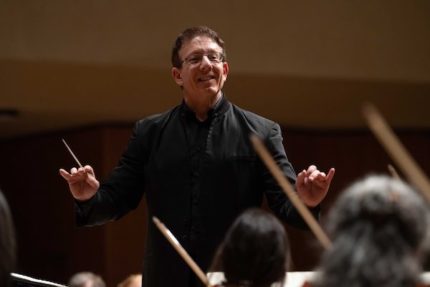Chicago Philharmonic opens season with lively works by composers of color

The Chicago Philharmonic Orchestra seems to have found its stride. Teetering on the brink of dissolution 15 years ago, shrewd, sustained reorganization by enlightened management appears to have landed the orchestra with a formula that works, and that makes it a vital addition to the city’s musical climate.
A versatile, largely musician-run ensemble, with a sizable roster of top-notch area players, the ensemble is equally at home offering a symphonic program as backing up a Queen cover band. Such flexibility has garnered the orchestra numerous accolades from the Illinois Council of Orchestras in recent years.
Artistic director and principal conductor Scott Speck has been a key figure in the orchestra’s revitalization, and was at the helm to open the CPO’s 33rd season Thursday night at the Harris Theater. He and the orchestra offered a program of shorter, vibrant works by composers of color that showcased the CPO’s skill and adaptability.
Speck opened the concert with the Prelude to Villa-Lobos’ Bachianas Brasileiras No. 4. The performance fully conveyed the undulating, sarabande feel of the work, enhanced particularly by sultry solo violin contributions from concertmaster Ilana Setapen, who was a standout all evening. The first half closed with an infectious rendition of the Danzón No. 2 of Arturo Márquez, though one that in spots lacked the guttural force that has greatly popularized the work.
Between these was Florence Price’s Ethiopia’s Shadow in America. Composed in the early 1930’s for solo piano, for decades it was only known in that version, until an orchestrated score was discovered in 2009. The tripartite essay portrays the sorrow of African slaves brought to America, their consolation in religion, and ultimate assimilation. A mournful opening gives way to a more flowing section reminiscent of spirituals, and the work ultimately concludes with an extended, genially urban depiction of “a fusion of…native and acquired impulses.” While Speck led a thoughtful account of the long-lost score, it was hard not to feel that Price was still finding her voice in this early work, and the easygoing depiction of racial assimilation inevitably feels somewhat simplistic in 2022.
Rounding out the first half was the Chicago premiere of Monograph by Jonathan Bingham, one of the CPO’s three Donna Milanovich Composers in Residence. Speck and Bingham shared an insightful conversation from the stage, in which the young composer discussed his debt to Samuel Barber and his compositional technique in the work, which is grounded in a rhythmically complex ostinato.
A muted statement of this figure opens Monograph, before giving way to fragments in the winds, a brass solo, and further elaborations. Bingham’s score is thoughtfully crafted with great attention paid to its organization. Still, a firm through-line was less evident on first hearing, and the various sections felt more like discrete episodes rather than an organic unfolding. It will be interesting to see what the young Bingham has in store for the orchestra next season, his third and last in residence.
The second half opened with Mourão, a brief dance work for string orchestra with percussion by César Guerra-Peixe and Clóvis Pereira. The piece is a repetitive, folksy dance that is attractive enough, but ultimately superficial, and one questioned its place on an already packed program.
The evening closed with the CPO’s first performance of William Grant Still’s Symphony No. 1 (“Afro-American”), composed at almost exactly the same time as the earlier Price work. Speck led an engaging account of Still’s probing score. He deftly navigated the oscillations between blues and spiritual idioms in the opening Moderato assai, and put across the angst of the ensuing Adagio. The Animato had boisterous, high-stepping energy, and Speck captured the cautious aspiration in the restrained expression of the final Lento, con risoluzione.
Speck and the orchestra followed the Still with an encore of W. C. Handy’s San Luis Samba, ending the evening in toe-tapping style.
The Chicago Philharmonic’s symphonic series continues January 14 at the Harris Theater with a program of Tan Dun’s Crouching Tiger Concerto, the American premiere of his Concerto for Guitar and Orchestra (Yi2), and the world premiere of Reinaldo Moya’s Cello Concertino with soloist Joshua Roman. chicagophilharmonic.org
Posted in Performances

